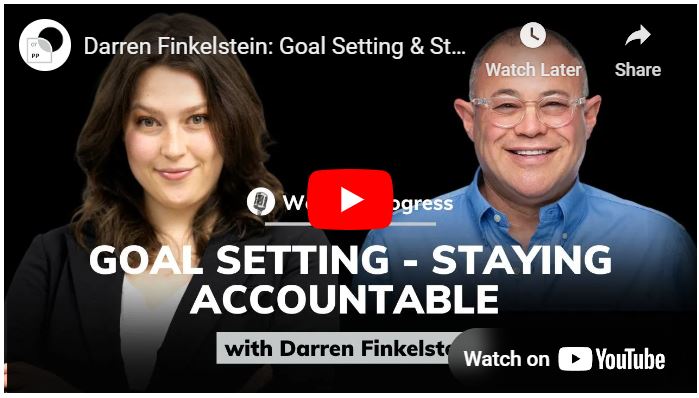When a team is running smoothly, every member does their part and keeps things moving. But what happens when someone drops the ball? A missed deadline. A forgotten task. A result that was promised but never delivered. It happens more often than leaders would like to admit. And while it’s easy to point the finger, the better move is to figure out why it happened and what to do next. Accountability in a workplace isn’t just a box-ticking exercise, it’s a shared commitment. When that commitment slips, it affects the whole team.
Discover your Accountability Score and increase the probability of smashing your GOALS and Getting Sh!t Done!
Letting missed goals slide without tackling the root can lead to confusion, lower morale and tension. The rest of the team might feel the weight of picking up the slack, and trust can take a hit. So how should you deal with it? The answer isn’t to overreact or shame the person involved. It’s about identifying patterns, resolving the issues causing the problem and making sure expectations and support systems are solid enough to prevent it happening again.
Understanding Why Team Members Miss Accountability Goals
Before any fix can happen, it’s important to understand what went wrong. People miss their goals for different reasons, and jumping to conclusions can backfire. Often, what looks like laziness or poor attitude is actually something deeper. That’s why it’s important to get to the real reason behind the slip.
Here are some common causes:
– The goal wasn’t clear: If team members don’t know exactly what’s expected, it’s easy to panic, delay or go off track.
– The goal wasn’t realistic: Stretch goals can be motivating. Impossible ones? Not so much.
– They didn’t have the right support: Without tools, feedback or help along the way, progress can stall quickly.
– Priorities clashed: Sometimes, other tasks pull focus and the original goal gets buried under busywork.
– Personal challenges: Burnout, stress or things happening outside the workplace can all take a toll on performance.
The key here is not to assume, but to ask. Open up a non-judgemental chat and let the person explain in their own words. You might hear something unexpected. For example, a team leader once struggled to hit a planning milestone. After a brief check-in, it turned out they’d been trying to untangle unclear handover notes from someone who had left the role. Solving the issue became about improving internal documentation, not blaming the current team member.
Blame rarely takes us anywhere useful. But asking honest questions does. Once you know the why, you can move on to reshaping the how.
Strategies To Address And Prevent Missed Accountability Goals
Dealing with missed goals is one thing. Stopping it from happening again is the real win. Accountability doesn’t stick by chance. It has to be built into how a team works. Here’s how to help that happen.
Communicate Clearly And Set Realistic Expectations
If a task or goal is vague, people are left guessing. Be specific about what success looks like, the steps involved and the timeline. Don’t assume every team member shares the same interpretation of your instructions. It always helps to double check that everyone’s on the same page.
Some questions worth asking:
– Does this goal make sense to you?
– Is this timeline practical, given everything else on your plate?
– Do you know who to talk to if you get stuck?
These conversations don’t take long, but they make a huge difference.
Offer Regular Support
A one-and-done approach to assigning work doesn’t work. People need feedback, encouragement and sometimes correction during the work, not only after it’s failed. Set up check-in points, offer help before it’s asked for and be present during the process.
Being present doesn’t mean micromanaging. It means being aware. It’s about making sure someone knows you’ve got their back and that they can check in when things get off track without fear of judgment.
Build An Environment That Encourages Ownership
When people feel safe to be honest and are supported when things go wrong, they’re more likely to speak up early. This avoids last-minute disasters. Encourage responsibility by making accountability part of the team dynamic. Make sure everyone sees how their work fits into the bigger picture.
Talk about impact regularly, not just performance. Remind the team how their efforts support wider business goals. People care more about meeting goals when they understand the wider effect of those goals.
The effort put into improving communication, culture and trust often goes further than penalties or warnings. Most people want to perform well. Leadership’s job is to help them succeed by offering clarity, fair targets and backing when needed.
Implement A System Of Regular Reviews
If feedback only happens when something’s gone wrong, you’re already too late. Regular reviews help identify blocks while there’s still time to steer things back on track. These catch-ups don’t need to be long or formal. Even a quick 15-minute check-in each week works.
Use the time to track progress, clarify targets and offer support. Keep the tone light and curious. This isn’t an interrogation. It’s about finding out what’s working, what’s not and what needs adjusting.
Some helpful questions:
– What’s going well right now?
– What’s slowing you down?
– How can I help?
Use this time to recognise wins too. Regular recognition helps people feel seen, which boosts morale and connection to the work.
Use Digital Tools To Track And Measure Progress
Keeping everything in your head? That’s a fast track to lost details. A good tracking system takes pressure off and gives visibility to everyone. It helps both leaders and team members see what’s been done and what still needs attention. This way, accountability becomes part of the rhythm of the day rather than a scramble when goals are missed.
Look for simple, clear tools. Shared task boards, milestone trackers or project software make it easy to keep up without adding more admin. The visibility alone often prompts the next action.
Just don’t let the system become the focus. It’s a support tool, not a scorecard.
Encouraging Self-Improvement And Personal Accountability
Lasting change always comes back to the individual. Structures and support help, but real accountability kicks in when someone chooses to own their role. That’s where you want your team to get to.
Here are a few ways to encourage this mindset:
– Set goals together so they feel relevant and fair
– Break big goals into smaller, digestible steps
– Have regular check-ins based on self-reflection, not blame
– Hold space for honest chats when something goes wrong
Consider adding monthly self-reviews or end-of-week reflections to team habits. Not for grading, but for growth. Build awareness, not pressure.
Individuals who know their strengths and weaknesses are easier to lead. They flag problems early, ask better questions and bounce back faster from setbacks.
Responding To Missed Goals Without Ruining Morale
The part most leaders dread is what happens after a goal is missed. You’ve done the prep, offered support and it’s still fallen short. What next?
Start early and keep it calm. Sit down with the team member and work through what happened. Skip the blame game. Frame it as: “Let’s look at what stopped this from landing. Let’s figure out what needs to shift.”
That simple change in tone can change the whole outcome. You get honesty instead of defensiveness and a real fix instead of surface answers.
Look to build an action plan that includes:
– A breakdown of the current problem, based on facts
– What will be done differently moving forward
– What help they need from others
– When you’ll regroup and assess progress
If this becomes a pattern with someone or the team overall, it may be time to bring in external help. An accountability advisor can offer a fresh perspective, identify root issues that might be harder to see from the inside, and help turn good ideas into grounded habits.
Building Accountability Into Your Culture
Accountability doesn’t come from policies or systems alone. It comes from consistent behaviour, clear conversations, and a kind of leadership that everyone trusts. When goals are clear, support is available, and wins and lessons are shared openly, people tend to follow through. The recovery plan is part of the culture, not a last-minute fix.
Keep instructions simple. Check in often. Celebrate progress. And when something’s missed, take it as a moment to talk, learn, and reset. Everyone drops the ball from time to time. It’s how you respond that lays the foundation for stronger accountability moving forward.
Are you considering the benefits that an accountability coach can bring to your team? Explore how customised coaching from Tick Those Boxes can provide the insights and guidance needed to strengthen accountability across your organisation. We specialise in helping individuals and organisations become more accountable. Contact our team to see how our programs may help you establish a more effective and accountable workplace, allowing you to do the things you say you will do and getting your teams to do the same.


